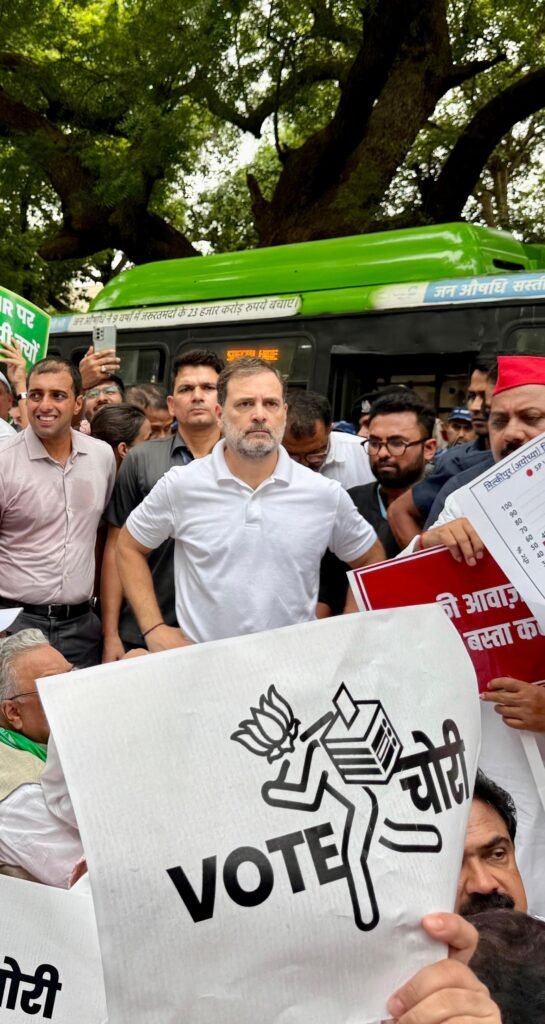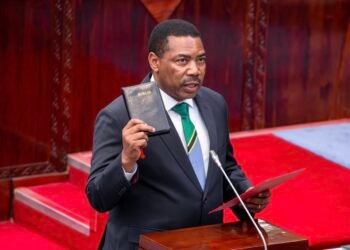NEW DELHI: In the searing mid-afternoon heat, the broad avenue between Parliament and the Election Commission’s headquarters turned into a corridor of confrontation. Around 300 opposition MPs and senior leaders from 25 parties of the INDIA Bloc marched shoulder to shoulder, carrying placards, chanting “vote chori” (“vote theft”), and accusing Prime Minister Narendra Modi’s government and the Election Commission of conspiring to steal elections.
At the head of the procession were Rahul Gandhi, Congress general secretary Priyanka Gandhi Vadra, Shiv Sena (UBT) leader Sanjay Raut, NCP patriarch Sharad Pawar, and RJD’s Tejashwi Yadav. Their immediate demand: halt the Special Intensive Revision (SIR) of Bihar’s electoral rolls. Their broader message: India’s democracy is under siege.
“This fight is not political. This fight is to save the Constitution… We want a clean, pure voters’ list,” Rahul Gandhi told reporters before police detained him along with several other senior leaders. As police barricades rose across the road near Transport Bhavan, chants of “Loktantra Bachao” (“Save Democracy”) grew louder. Some leaders attempted to push through before being bundled into buses by Delhi Police personnel.

The protest was triggered by the Election Commission’s decision to carry out the SIR just months ahead of the Bihar assembly elections. Opposition parties allege the exercise is aimed at disenfranchising the poor, Dalits, minorities, and opposition-leaning voters by deleting names or duplicating entries to benefit the BJP. Congress leaders point to what they say are “shocking anomalies”, voters appearing twice, names of people long deceased still on the rolls, and “first-time voters” aged 70 to 95 appearing mysteriously in the lists.
The BJP and the Election Commission reject these charges outright. The EC insists the revision is routine, required by law to remove ineligible entries such as those who have died or relocated, and says all changes are shared with political parties. “All complaints are investigated thoroughly,” an EC official said, adding that accurate rolls are essential to prevent fraud.
BJP leaders went on the offensive. Union Minister Dharmendra Pradhan accused the opposition of undermining public trust in elections. “They are in a state of bankruptcy because of their continuous losses,” he said. “This is an attempt to create a state of anarchy by sowing seeds of doubt about the electoral process.”
The protest was not spontaneous. On August 7, four days earlier, Rahul Gandhi hosted a closed-door dinner meeting at his residence with nearly 50 INDIA Bloc leaders, the first such gathering since June 2024. The meeting became a war room session. Gandhi presented a detailed 50-slide PowerPoint titled “Democracy Destroyed,” alleging booth-level fraud in Karnataka and elsewhere. He cited examples of duplicate voters, invalid addresses, missing photos, and inexplicable voter age data.
Leaders left that meeting with a common strategy: brand the EC’s Bihar revision as the “vote chori model,” take the fight to the streets, and mobilise public opinion in Bihar well before polls. This was not merely about Bihar, they stressed, but about setting a national narrative ahead of future state elections one in which the opposition casts itself as the last line of defence for India’s democratic franchise.
The timing is politically charged. Congress and its allies have underperformed in two state elections this year that they expected to win, despite the BJP losing its outright majority in the 2024 parliamentary polls and having to rely on regional allies. The INDIA Bloc sees in the Bihar revision a rallying point — a cause that could unite disparate opposition bases and re-energise street-level politics.
For observers, the protest marked one of the rare occasions when the Election Commission itself became the direct target of mass mobilisation. While critics warn that eroding trust in the electoral process without clear evidence risks destabilising institutions, opposition leaders counter that silence would be complicity. For them, the greater danger lies in normalising disenfranchisement, however incremental.
The imagery from August 11, buses packed with detained MPs, leaders waving defiantly through police cordons, and slogans echoing down Rajpath — will likely be replayed in opposition rallies for months. Whether this becomes the start of a sustained grassroots campaign or remains a flashpoint depends on how effectively the INDIA Bloc can convert this show of unity into votes on the ground.
Bihar’s elections will be the first real test. And with “vote chori” now a potent slogan, the contest ahead is not just for seats in an assembly but for the credibility of India’s electoral machinery itself. The choice before the nation may well be whether to accept the opposition’s charge that democracy is being hollowed out from within, or to trust that the guardrails of the republic still hold firm.
– Dr. Shahid Siddiqui; follow via X @shahidsiddiqui



















